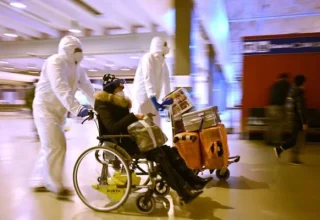ISLAMABAD, July 01 (Online): All data and statistics are based on publicly available data at the time of publication. Some information may be out of date. Visit our coronavirus hub for the most recent information on the COVID-19 pandemic.
Trouble sleeping and fatigue are among the often-reported symptoms of the condition known as “long COVID.” New research from the Cleveland Clinic in Ohio presents the findings of researchers investigating sleep issues in people who have recovered from COVID-19.
According to the research, nearly half of those who recovered from COVID-19 experience at least moderate sleep issues.
The research was presented in June at Sleep 2022, a meeting of the Associated Professional Sleep Societies, a joint venture of the American Academy of Sleep Medicine (AASM) and the Sleep Research Society (SRS).
There is a risk of developing long COVID even for the vaccinated, and researchers suggest the condition can persist for years for some people.
The researchers analyzed the experiences of 962 Cleveland Clinic ReCOVer Clinic patients between February 2021 and April 2022. The individuals filled out the sleep disturbance and fatigue questionnaire sections of the National Institutes of Health’s Patient-Reported Outcomes Measurement Information System (PROMIS).
The clinic found that its Black patients were more than three times more likely to have moderate-to-severe sleep disturbances after recovering from COVID-19.
Another factor that was associated with a higher than average incidence of sleep disturbance was anxiety.
After factoring for age, race, sex, and body mass index, the analysis concluded:
- After recovery from COVID-19, 41.3% of patients reported at least moderate sleep disturbances, and 8% described severe sleep issues.
- More than two-thirds of patients (67.2%) reported moderate fatigue.
Lead study author Dr. Cinthya Pena Orbea tells Sleep 2022:
“Our study suggests that the prevalence of moderate to severe sleep disturbances is high and that [the] Black race confers increased odds to suffer from moderate to severe sleep disturbances, highlighting the importance to further understand race-specific determinants of sleep disturbances in order to develop race-specific interventions.”
The abstract that includes data from February to November 2021 is published in OXFORD Academic SLEEP.
Triple the risk for Black people
Medical News Today asked Dr. Pena Orbea what might account for the higher proportion of sleep disruption among Black people. She replied:
“Understanding the potential causes underlying this association was not part of our research aims. However, it is possible that this factor may be related to a difference in healthcare access, neighborhood factors, [and the] disproportion of acute COVID-19 burden among black individuals.”
Dr. Michael Grandner, Ph.D., MTR, CBSM, FAASM, Director of the Sleep and Health Research Program at the University of Arizona and Director of the Behavioral Sleep Medicine Clinic at the Banner-University Medical Center in Tucson, Arizona, was not involved in the research. He told MNT:
“Several previous studies have shown that Black Americans are less likely to complain about their sleep than their White counterparts, but they tend to get less sleep and tend to be at higher risk of sleep disorders — especially those caused by stress and environmental factors. They are also more likely to have problems with COVID-related risk factors like cardiometabolic and lung diseases.”
Anxiety and sleep disruption
“Hundreds of studies,” said Dr. Grandner, “have characterized the strong but complex relationship between sleep and anxiety. For example, anxiety causes a condition called ‘hyperarousal’ — where you are often on alert even if there is no reason to be — and this is a common cause of sleep problems in these individuals.”
Dr. Pena Orbea noted the circular effect anxiety and lack of sleep might have on each other.
“There is a bidirectional effect,” pointed out Dr. Pena Orbea, “between sleep and mental health. Mood disorders are highly prevalent among patients with sleep disturbances. Likewise, sleep disturbances can increase the risk or exacerbate mental distress.”
Fatigue more common than sleep disruption
With more people, nearly two-thirds, reporting fatigue than reporting sleep disruption, there is some unclarity in the relationship, if any, between the two.
Dr. Pena Orbea noted, “Our next steps will be to further investigate the interplay of fatigue and mood with sleep disturbances as it relates to [the] Black race.”
“Sleep disturbance can cause fatigue,” said Dr. Grandner, “but many other things can as well. Then again, many people may have difficulties with sleep that they may not even be aware of — for example, shallow sleep — that leads them to feel less rested and more fatigued.”
- Sleep / Sleep Disorders / Insomnia
- COVID-19
FEEDBACK:
Written by Robby Berman on June 17, 2022 — Fact checked by Alexandra Sanfins, Ph.D.
Long COVID still a risk, even for vaccinated people
Share on PinterestCOVID-19 vaccines have been shown to reduce death and long COVID risk. Sebastian Kahnert/picture alliance via Getty Images
- COVID-19 vaccines can lower the risk of death by 34% and long COVID by 15% compared to the unvaccinated with SARS-CoV-2 infections, a new study has found.
- The researchers also observed that vaccines have been remarkably effective in fending off some of the worst long COVID symptoms, including lung and blood-clotting disorders.
- However, the researchers also found that mild breakthrough COVID-19 infections can trigger lingering, severe symptoms of long COVID even in vaccinated people.
- Experts say these findings highlight the need for new vaccines and ongoing safety protocols beyond immunizations to help prevent long COVID.
All data and statistics are based on publicly available data at the time of publication. Some information may be out of date. Visit our coronavirus hub for the most recent information on the COVID-19 pandemic.
Long COVID can cause persistent COVID-19 symptoms including loss of smell, fatigue, mood changes, and brain fog in addition to disorders of the heart, kidneys, and lungs. These symptoms emerge or continue at least one month after a SARS-CoV-2 infection.
It is estimated that 7.7 to 23 million Americans may have developed long COVID, a condition also called post-acute COVID or chronic COVID.
A study at the Washington University School of Medicine in St. Louis and the Veterans Affairs St. Louis Health Care System suggests that vaccination alone may not be enough to stop breakthrough COVID-19 infectionsTrusted Source and prevent long COVID.



























